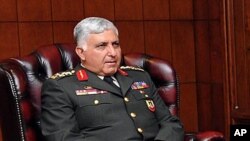Turkish Prime Minister Recep Tayyip Erdogan has appointed the chief of the paramilitary police, Necdet Ozel, as acting head of the armed forces. The move came after Turkey's entire military command resigned Friday amid escalating tensions between the secularist military and Islamic-rooted government.
Necdet Ozel's appointment to head the armed forces came within hours of the mass resignations, as Turkish Prime Minister Recep Tayyip Erdogan and President Abdullah Gul moved quickly to defuse the crisis.
Speaking at a news conference, President Gul downplayed the resignations.
President Gul told reporters Saturday no one should see this as a crisis in Turkey. He said the developments Friday were extraordinary within its scope, but that everything is continuing on its own course. He said there is no [power] vacuum.
Turkey's once-powerful military has played a key role in domestic and international affairs. Domestically, it had staged three coups since 1960 and pushed the country's first Islamist-led government from power in 1997.
Turkey also has the second-largest number of troops under NATO, and has been an important ally to U.S.-led military operations in Afghanistan.
Reacting to news of the resignations, U.S. State Department spokesman Mark Toner expressed confidence in the stability of the Turkish armed forces. "We have full confidence in the strength of Turkish institutions both democratic and military, it's an internal matter," he said.
Media reports say Armed Forces Chief General Isik Kosaner asked to leave. The resignations came after Kosaner met with Prime Minister Erdogan and President Gul to discuss key promotions of military staff at a meeting of the Supreme Military Council next week. Erdogan is reported to have signaled he would block promotions for officers he believed were part of a conspiracy to bring down his government.
Authorities have detained more than 300 people as part of a wide-reaching investigation into plots to undermine the government. Some 200 active and retired military officers, including 30 generals, have been charged in the probe. Most of the officers who have been charged are being held in prison.
Turkey's Prime Minister Appoints New Armed Forces Chief




